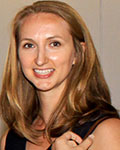2018
Chelsea Redeker Milbourne
- Assistant Professor
- California Polytechnic State University, San Luis Obispo

Abstract
In eighteenth-century Great Britain, public audiences witnessed an array of scientific and technological wonders, from air pumps and hot air balloons to microscopic creatures and mechanized models of the solar system. “The Utility of Wonder” examines these sensational displays—as well as the complementary experiences of reading books, attending lectures, operating instruments, and conversing with other enthusiasts—as rhetorical phenomena that characterized philosophical objects as spectacles in order to make them publically accessible. This project particularly attends to the rhetorical influence of audiences, notably women, whose visible spectatorship and ongoing study augmented the wonder of science displays, serving to both publicize experimental findings and stoke anxieties that interest in science was becoming too popular. Eighteenth-century science spectacles thus provide a case study for examining how communities delimit access, not only to scientific inquiry but also to public science education, interest, participation, and deliberation.

